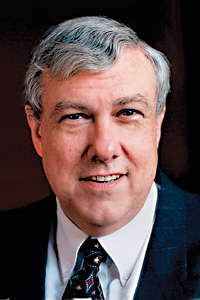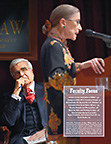A Tribute to a Legal Historian’s Lasting Influence and Legacy
Printer Friendly Version William E. Nelson ’65, Judge Edward Weinfeld Professor of Law, has been associated with the NYU School of Law for nearly half a century, and has been an active legal historian for almost as long. He has spent more than 30 of those years as a professor. A two-day conference last May, “Making Legal History,” honored the scope of Nelson’s influence.
William E. Nelson ’65, Judge Edward Weinfeld Professor of Law, has been associated with the NYU School of Law for nearly half a century, and has been an active legal historian for almost as long. He has spent more than 30 of those years as a professor. A two-day conference last May, “Making Legal History,” honored the scope of Nelson’s influence.
Nelson has helped to cement NYU Law’s reputation as a legal history leader. He moderates the Legal History Colloquium, which he founded in 1982. Nelson has also played an integral role in the Samuel I. Golieb Fellowship in Legal History Program, the oldest fellowship of its kind. The Golieb Fellowship has become a mandatory training ground for promising legal history scholars who come to NYU Law to conduct research and present their work in the colloquium before going on to secure top teaching spots in their chosen specialty.
Former Golieb Fellows presented original scholarship in panels over the course of the conference, on topics such as 19th-century U.S. legal history, the legal history of race, and courts and judges. Panel chairs included Vice Dean Barry Friedman; Charles Seligson Professor of Law Daniel Hulsebosch; AnBryce Professor of Law Deborah Malamud; Professor Troy McKenzie ’00; Vice Dean Liam Murphy; and John Phillip Reid (LL.M. ’60, J.S.D. ’62), Russell D. Niles Professor of Law Emeritus.
Hulsebosch, who organized the conference, wanted to harness the power of the Golieb Fellows’ scholarship. “The Goliebs represent some sizeable proportion of all legal historians who have come out of graduate school or law school over the last generation,” said Hulsebosch, a former Golieb Fellow himself. “I wanted the focus in large part to be on the scholarship, to show how much of an influence Bill has had on all these people who are producing the best work in the field.”
Colleagues discussed Nelson’s influence in the field of legal history. More than one panelist invoked “generosity” as the honoree’s primary characteristic.
Morton Horwitz, Charles Warren Professor of American Legal History at Harvard Law School, recalled the days when he and Nelson were Charles Warren Fellows at Harvard, each researching their first books. Nelson tirelessly combed various courthouse archives for his primary research, Horwitz recalled, but remarkably, freely shared the fruits of his labors with Horwitz.
“I have not seen that in the remaining 40 years of my academic life,” Horwitz said. “It was a sense of generosity and an investment in a common purpose. We were going to make legal history a field; we needed to try to help each other as best we could. Bill really did make a big difference in my understanding of that which I was working on.” Horwitz and other panelists pointed to Nelson as a pioneer of digging through original sources to examine everyday cases, in order to better understand developments in the history of the law.
Larry Kramer, dean of Stanford Law School and former associate dean of NYU Law, praised Nelson’s contributions to the Law School. “Bill has been incredibly prolific and done work across a ridiculous number of subjects, especially for a historian. Nonetheless, his greatest legacy will be the enormous number of lives he’s influenced and careers he’s shaped.”
Professor Lauren Benton of NYU’s Department of History, also an affiliate professor at NYU Law, pointed out that Nelson’s generosity extends far beyond the Law School to history graduate students from all over. “Bill has had a profound influence on me and on many who work outside American legal history,” Benton said. “He is a global comparative legal scholar, he is a model historian…. He is an institution builder, a field shaper, and a friend.”
—
All of 2010 Faculty Focus

 Multimedia
Multimedia